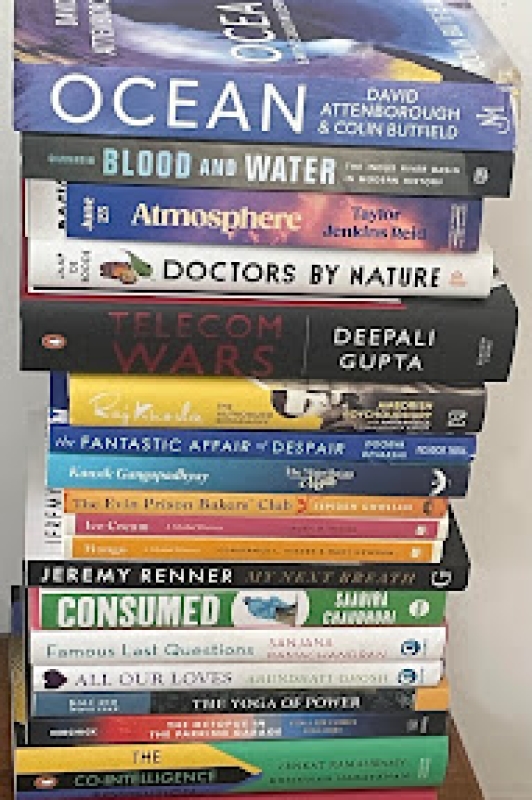- Belem countdown: Climate talks race to the finish |
- 100 rooms of a colony burned to ashes in Gazipur |
- BNP demands Returning Officers, Assistant ROs from EC’s staff |
- Stocks extend gains as market sentiment turns brighter |
- Massive fire at Gazipur factory; 500 workers evacuated |
Why me? But why would it not be me?

Books
Sudhirendar Sharma
Reading books have never been an escape for me. Books instead give me a company - during a flight, in a waiting lounge and in the privacy of a clean toilet. I never feel lonely in the company of a book, however, it encourages solitude for me to attain personal space and tranquility. Books have helped me visit new places, meet unknown people, and travel to bygone era in history. Books should be valued as much because each book, each story, and each character has something to teach its reader. Each book is unique, and each book has something different to offer you and something different to teach the reader.
One Medicine
Collecting books has been a habit for long, however, reading them got value-addition to the collection during the past two decades only. It has continued ever since, resulting in serious space constraint for housing books. Bookshelves have continued to expand at the cost of shrinking wardrobe. Simply put, books are proud possession, and a new book is added to my personal library every week. It is a typical middle-class home in which books can be found in every room. The only condition being that the books found in one room do not get replaced, as space is not easy to be found elsewhere.
Ice Cream, A Global History
The first thing I noticed as I got back to my senses after being hit by a paralytic attack was a book titled One Medicine. The author of the book Dr, Matt Morgan concluded that the most time we spend with animals is when they are in our plate and suggested that learning how animals survive and thrive be brought into our circle of concerns. My cognitive ability to comprehend more than a printed page was grossly restricted. Luckily, the book took a fascinating dive into the physiology of the animal kingdom which let me know that the female kangaroos have three vaginas for different purposes – two for having sex and one for giving birth. It came to me as a surprise.
It has been a year of recovery for me during which I got to meet many relatives and numerous friends. The relatives and friends continued visiting me, but towards later part of the year their numbers shrunk. Rightfully so, as much of it was replaced by convenient phone calls and video chats. It worked no less. But books maintained their incoming regularity – a book once every week. Since virtual books were neither my choice nor compulsion, I got a chance to get as many as 55 new books in little more than 10 genres. Books have been comforting and transformative.
A devastating accident in Rome in 2022, did leave the noted writer Hanif Kureishi paralyzed but not without any dent on his creative zeal. In Shattered, he records his daily ordeal with rare insights from hospital beds in different hospitals, and questions: Why me? Rarely it ever gets a credible answer. Why it would not be you? Though we would like to be acknowledged for our exceptional qualities, it is our ordinariness that comes to the surface most of the times. And this is what leaves us wondering ‘who else but not me’. Though we may be important to one another, according to Kafka, we are not much more than nothing in the universe.
The self, howsoever exceptional, is as best an illusion. Didn’t the Buddha, argued thousands of years ago, that our belief in self is the root cause of most of our sufferings? Poring over ancient Buddhist texts, Jay L. Garfield, Maria Heim and Robert H. Sharf teamed together to dismantle notion of the self in their book How To Lose Yourself. Such books listen and make us forget our trouble. Need it be said that books smell great, they are reliable, they are informative, and they’re always there when you need them.
As one gets exposed to books one learns so much that is both distinctive and fascinating, as well as enriching and exhaustive. If nothing, it helps reflect upon new perspectives and ideas. Once considered an indulgence befitting only the elite, this Italian invention has evolved into one of the most popular mass-market food products ever developed. In Ice Cream: A Global History, journalist Laura B. Weiss takes the reader on a fascinating journey through the ages to tell the lively story of how this delicious dessert became a global sensation. With artificial intelligence occupying center-stage in all that we speculate, The Co-Intelligence Revolution envisions a future in which human ingenuity and artificial intelligence work as powerful allies to co-create ground-breaking innovations and transformed institutions. Citing the case of beauty giant L’Oreal, Venkat Ramaswamy and Krishnan Narayanan provide insights on how artificial intelligence engages as co-worker and coach in generating new processes and products.
The books on diverse topics become an essential fodder (for me) to keep the cognitive faculty meaningfully engaged. It has been a quarter century of collecting, reading and generating book reviews. As many as 26 books out 55 were reviewed during the year and published in reputed newspapers. The yearly assessment by the neurosurgeon revealed that the progress has been overtly satisfactory. Even in the medical exigency the positive approach towards life has worked its way forward, according to the doctor. Books have played a major role in keeping the cognitive aspect pepped up.
(Dr. Sudhirendar Sharma is a writer and researcher specializing in development issues. He is based in New Delhi, India)
First published in the Hindustan Times.

